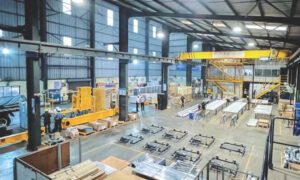Addressing unreliable, energy inefficient cold chains for life-saving medicines and safe food key to deliver sustainable cooling access without exacerbating the climate crisis
According to Sustainable Energy for All (SEforALL) research, temperatures hit highs record globally. Significant populations are at increasing risk because of lack of cooling access, threatening a spike in global energy demand and profound climate impacts.
Chilling prospects: ‘Tracking Sustainable Cooling for All 2019’, shines a light on the growing cooling access challenge. This year’s report finds that the public safety, health, safe medicine and food supply for 1.05 billion people in poor rural and urban areas are now at risk from lack of access to cooling. That includes adequate refrigeration, air conditioning and other areas that are essential as the earth’s temperatures rise due to climate change.
India represents one of the countries to drive the change for rural people living in poverty with significant increase in rural energy access. The Indian government took an important step by publishing the India cooling action plan (ICAP) in March 2019. The plan recognises the issue of cooling for development and addresses the threat of climate change. It aims at plummeting the cooling demand by 20-25 per cent, refrigerant demand by 25-30 per cent, and cooling energy requirements 25-40 per cent from 2017-2018 levels in their 20-year target plan. However, cooling access risks in India remain widespread among rural people, the urban poor and those ready to buy their first cooling device.
“Developing economies are now at threat of suffering from a ‘productivity penalty’ as they deal with record temperatures and lack of cooling, stunting economic growth and further exacerbating global cooling injustice. Moreover, with the rapid urbanisation across the world and significant rise in temperature, we risk a significant increase in the number of people without access to sustainable cooling,” said Antonio Mexia, Chairman, SEforALL Administrative Board and CEO of Energias de Portugal (EDP).
This year’s report shows a notable growth in the numbers of ‘urban poor’ – those living in cities yet often lacking consistent access to electricity – at highest risk from a lack of cooling access. 680 million people living in urban slums have little or no cooling to protect them in a heatwave – a rise of 50 million people in the past year – with an additional 365 million people living in poor rural areas also at high risk. A further 2.2 billion in the lower middle class are only able to afford cheaper, less energy efficient air conditioners, potentially causing a spike in global energy demand and profound negative climate impacts.
Brian Dean, Head of cooling and energy efficiency at sustainable energy for all, highlighted the need to see cooling access as a right, “In a warming world facing ongoing deadly impacts from climate change, we can no longer see cooling as a luxury. In a heatwave, it can be a matter of life or death for children and older people, as well as allow people to be productive at work, store food securely, or receive safe medicine in a hospital. Delivering sustainable cooling is an issue of equity that will enable millions to escape poverty and help to realise the Sustainable Development Goals.”
Highlight findings from this year’s report include:
- In 52 high-risk countries, 365 million people in rural areas and 680 million people in urban slums are at risk due to:
- Poor rural areas lack access to safe food and medicines
- Poor urban slums have little or no cooling to protect them in a heatwave
- 2.2 billion people present a different risk, a rising, lower-middle class in developing countries, who are only able to afford cheaper, less efficient air conditioners that could create a spike in energy demand and rise in emissions.
- Across the 52 high-risk countries, at least 3.2 billion people face cooling access challenges in 2019.
- Cities across the world are growing and becoming hotter, which is causing increasing pressure on their electricity systems to deliver cooling sustainably.
- Many countries do not have national cooling plans that will invest in infrastructure to provide residential and commercial cooling, address damage to the climate by inefficient cooling systems and establish cold chains that support food security and medical security.
Chilling Prospects: The plan sets out a series of action-oriented recommendations with complete resources to allow policymakers, development financiers, and industry to accelerate access to cooling, including –
- Government policymakers should develop and implement comprehensive national cooling plans that protect the vulnerable and conduct needs-assessments.
- Donors, development practitioners and financiers should prioritise the most vulnerable. To do so, they must harness a diverse set of financing tools to deliver universal cooling access. There is also a clear need to track financial flows directed towards access to cooling for at risk populations.
- Industry and business must ensure efficiency and affordability at the ‘Base of the Pyramid’, accelerating action through skills development, maintenance, and technician training.
- In addition to supporting policy planning at the national level, cities and local authorities should use the needs assessment to identify priority actions to protect their most vulnerable populations.
The report draws attention to the direct intersection between three internationally agreed goals: the Paris Climate Agreement; the Sustainable Development Goals; and the Montreal Protocol’s Kigali Amendment. One of the key goals of the Kigali Amendment is to limit consumption and production of hydrofluorocarbons (HFCs), a potent greenhouse gas used widely in air conditioners and refrigerators.
The report was produced in partnership and supported by the Kigali Cooling Efficiency Program (K-CEP). The Chilling Prospects research is part of SEforALL’s Cooling for All initiative, which developed the report along with contributions from the Global Panel on Access to Cooling.
For more information, visit
SEforALL.org and
Follow @SEforALLorg
Cookie Consent
We use cookies to personalize your experience. By continuing to visit this website you agree to our Terms & Conditions, Privacy Policy and Cookie Policy.















